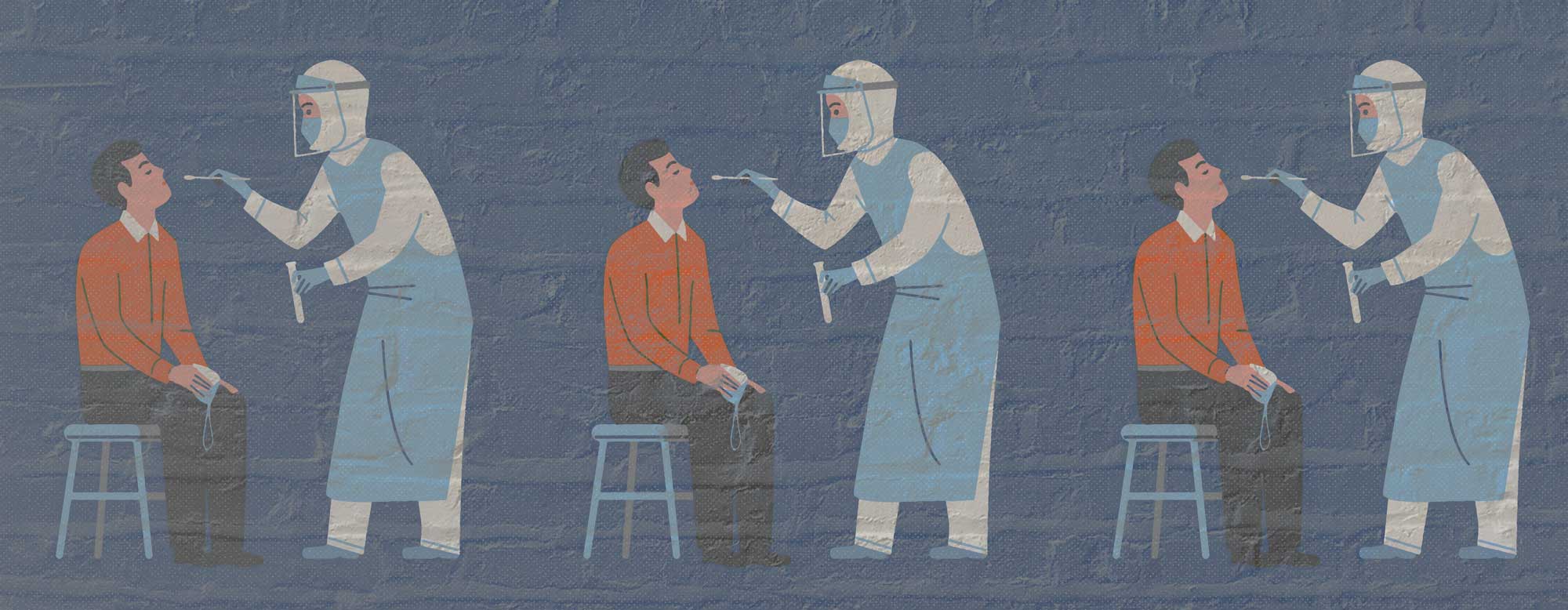An unmistakable optimism has returned to countries like Australia as lockdown restrictions begin to ease. Even the news cycle has begun to focus on issues other than the coronavirus, to our collective relief.
For several months there was blanket news coverage of the pandemic. Media outlets kept feeding our insatiable appetite to know more about a crisis that so directly impacts our health, our livelihoods, and our loved ones.
I remember seeing early reports suggesting that the death toll could approach 68 million. It is a relief, then, that as infection rates flatten in most countries, the death toll has been only a tiny fraction of what we were warned. My own country of Australia has been especially spared, in what almost seems like a miracle.
It is heartening to see that people the world over have been responsive to warnings about personal hygiene and social distancing—strategies that have clearly helped slow the spread of the virus.
But there’s also the possibility that fear turned out to be a far more contagious virus, and that—as some warned—the cure we’ve applied may ultimately prove worse than the disease.
Many have made the mistake of stating their case about COVID-19 with too much certainty, and this has been true of scientific modellers and conspiracy theorists alike. So everything I’ve written below comes with a caveat: check my sources, and do your own research and thinking, too.
But also be encouraged that we can reopen with confidence, so long as we stay vigilant. If you still need convincing—or if you’ve been suspicious of a mass overreaction these last few months—consider these ten things you might not have heard about COVID-19.
1. The virus poses a very small risk to young people
I shouldn’t have to state this, but I know the accusations will fly, so here it is: all people are equally valuable. The elderly deserve our care and concern as much as the young.
But the data is clear that COVID-19 is far more deadly for the elderly and the already-ill than for the general population. For those who are generally healthy and below the age of 65, death is remarkably uncommon, even in pandemic epicentres. The data suggests that for those below 20, the flu is actually more deadly than the novel coronavirus.
For this reason, governments are now turning to strategies that focus on protecting the elderly rather than treating all people as equally at risk. Over a dozen U.S. states have learned this the hard way, after half of their fatalities took place in nursing homes.
2. The virus is far less deadly than first predicted
Antibody tests have been conducted in various places to detect how many people have previously had the virus. In parts of New York, 15% of those tested had coronavirus antibodies. Studies have yielded similar results in California and Germany.
Given that the actual caseload in these places was far lower than 15%, there are apparently many who are contracting the virus but showing very mild symptoms or none at all.
If these antibody tests are accurate—which is still in question—it would mean that the case fatality rate would be more like 0.5%. Indeed, the CDC’s current “best estimate” of the virus death rate is 0.4%, or even 0.3% if asymptomatic cases are included.
This is far less than the 3.4% global death rate originally reported by the World Health Organisation. (For comparison, the fatality rate of the flu is around 0.1%).
3. Virus antibodies may provide immunity
Scientists have been warning that having antibodies from the virus doesn’t necessarily guarantee immunity. So even if the antibody tests are accurate, they say, we shouldn’t be too quick to celebrate.
But also this week, two studies were released strongly suggesting that COVID-19 antibodies may indeed provide immunity to the virus. This is an area of research worth watching closely.
4. The virus doesn’t easily spread from surfaces
Early research found that the virus could remain detectable on various surfaces for many hours and even days at a time. This was an important justification for “safer at home” messaging and the shuttering of public facilities and businesses worldwide.
The CDC originally issued guidelines in line with this research, but just over a week ago the institute changed its tone. Based on newer epidemiological data, their website now explains that the virus spreads mainly through person-to-person contact and that it doesn’t easily spread from surfaces.
5. Sunlight and fresh air can protect against the virus
In recent weeks, a UK chief scientific advisor told MPs that sunlight and good ventilation are both “highly protective against transmission of the virus.” Since then, restrictions have been relaxed to allow Brits to exercise outdoors as much as they like.
This aligns with what we already knew about influenza and similar infections. And it suggests that closing beaches and national parks and restricting people’s movement outdoors may not have been a wise policy in the first place.
6. Lockdowns may actually be ineffective
The debate over extended lockdowns versus reopening the economy has become highly politicised in the United States especially. Many have been at pains to warn states eager to reopen that if they do so too quickly, an appalling surge of deaths may follow.
But a fascinating study comparing various US states showed that, in fact, there is no relationship between COVID-19 deaths and lockdown policies.
Adjusting for variables, the study found that states with strict lockdown policies actually had almost twice as many infections per capita than those without them, and also more deaths per million—the exact opposite of what might be expected. Similar results were seen by comparing European countries with one another.
7. Lockdowns may lead to global famine
It’s widely acknowledged that the lockdowns will have a devastating impact on the world economy. Some have trivialised the desire to reopen as a lust for stock market gains at the cost of lives. But it’s no secret that many who promote the ongoing closures have the luxury of working from home, while countless small businesses permanently close and families go hungry.
What the debate in western countries has largely missed, however, is how lockdowns here will affect food supply chains elsewhere. Many families in developing nations rely heavily on international tourism for survival. Others depend on family members in the West—who are now out of work—sending regular financial support.
All of this has led David Beasley, director of the United Nations World Food Program, to warn that the world could face “multiple famines of biblical proportions within a short few months.” In his assessment, there is “a real danger that more people could potentially die from the economic impact of COVID-19 than from the virus itself.”
8. Lockdowns are causing a spike in suicides
Another story only now beginning to make the news is the adverse effects of lockdowns on mental health and suicide. Following Boris Johnson’s announcement of a lockdown, numbers of people in the UK reporting significant depression and anxiety more than doubled.
Studies in the US reveal similar trends there, even suggesting that more lives will ultimately be lost than were saved through lockdowns. Here in Australia, modelling conducted at Sydney University warns that an additional 1,500 suicides may result from the impact of the coronavirus restrictions.
Doctors in California report seeing more deaths from suicide than coronavirus since the lockdowns began. Similar stories are emerging from countries as diverse as India, the UK and Thailand.
9. Reactions to the virus have triggered a health crisis
There is also a broader health crisis developing. 600 American physicians recently sent a letter to the White House warning of patients avoiding routine medical tests and emergency care due to excessive fear of the virus. The cancelling of elective and routine procedures has likewise contributed to the crisis.
“These include 150,000 Americans per month who would have had a new cancer detected through a routine screening that hasn’t happened, millions who have missed routine dental care to fix problems strongly linked to heart disease/death, and preventable cases of stroke, heart attack, and child abuse,” the letter says.
10. People are praying like never before
There is no doubt that we are still facing a global health emergency. Almost 400,000 people have lost their lives to the virus. And while many western nations are experiencing a reprieve, our attention must shift to countries like Brazil, Indonesia and Mexico whose death rates continue to rise. These aren’t mere numbers—they are people with families now grieving.
Without the intervention of governments, this pandemic could have been much more dire. And we must be careful not to expect perfect foresight from our leaders, or judge them using data that is only now emerging.
But we can continue to make our voices heard if we believe they are making misjudgments. As the US Declaration of Independence so simply states, “Governments are instituted among Men, deriving their just powers from the consent of the governed.” Our political leaders govern us, but they do so as our representatives, not our masters.
Most importantly, we can continue making our voices heard to God. There has been a global movement of prayer these last few months that has no comparison in recent memory. Considering even the tamest predictions made back in February, it’s clear to me that God is hearing these prayers and has so far spared us from a much greater catastrophe.
In a time when we too often look to the State for help or for someone to blame, God has shown himself strong and mighty. People may make all sorts of mistakes, but as Psalm 46 declares: “God is our refuge and strength, an ever-present help in trouble… Be still, and know that I am God; I will be exalted among the nations, I will be exalted in the earth.”























